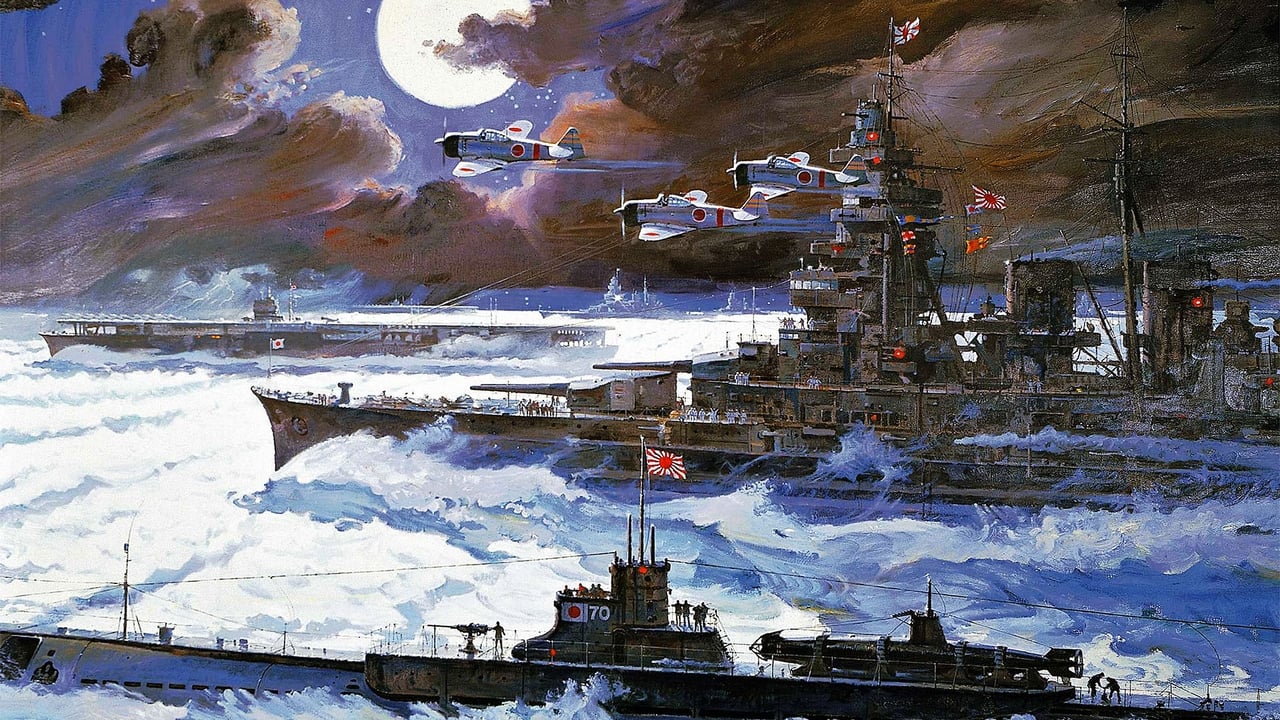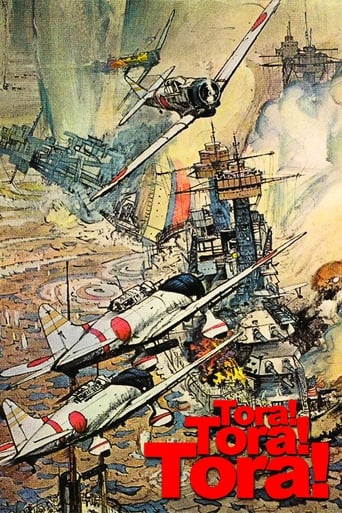

It takes some courage to take an event that is such a wound to the psyche of the American people and give it an alternative perspective. This is not to accept the motivations of the Japanese Empire, but it gives a reasons for why Pearl Harbor happened. I'm hoping that contemporary society doesn't use the insipid movie "Pearl Harbor" as a benchmark for an understanding of this event. We all know that at some point, someone dropped the ball. It would have been surprising if someone had not. There were too many cooks and an arrogance that left the door open. Through some excellent research, the producers have allowed us inside the planning stages that led to the bombing. There was plenty of warning. There were just too many layers here. As this film goes along it accomplishes what every film aspires to. It makes us think we are watching actual historical figures in action, in a kind of documentary.
... View MoreWhat is presented are the facts - from both the American and Japanese perspectives - of what led up to the attack on Pearl Harbor and the attack itself. It doesn't attempt to add any fictional characters to the extent that this is possible or add steamy love scenes (2001's Pearl Harbor, I'm looking at you). The lesson here is never underestimate your enemy, and how easy that is to do when layers of bureaucracy are in the way, layers of bureaucracy that just can't believe that a nation of people that Americans then thought racially inferior would actually decimate Pearl Harbor to the degree that they did. Did you realize that in 1941 many Americans thought that Asians had poor eyesight because of the shapes of their eyes? I didn't learn that from the film, but it helps explain why so many prewar dramas were aimed at the Germans while the Japanese were practically ignored.Central to the plot is that U.S. Army Col. Bratton (E. G. Marshall) and U.S. Navy Lt. Commander Kramer (Wesley Addy) decipher the Japanese Purple Code and from the messages that they intercept, believe that attack is imminent. They pick the wrong week, but they have the right idea. As the warning goes up the chain of command so many things go wrong on the American side. Key generals or people reporting directly to the president are out riding horses or walking their dogs or doing what people do on weekends. Finally, Chief of Naval Operations Harold R. Stark (Edward Andrews) is notified and urged to call Hawaii, but no, he says he wishes to call the president first. He asks everyone to leave the room. After everyone leaves Stark is staring at the phone but it is not clear if he ever called anyone. Why??? Meanwhile, Admiral Kimmel (Martin Balsam) is quite afraid of attack in the months leading up to December 7, but his reaction is counterproductive. He orders all aircraft placed as close together as possible so they can be easily monitored for acts of espionage. That's fine, but it also makes it easy for the Japanese to destroy all of them with a few bombs.The morning of December 7th, two ordinary soldiers are ordered to be up bright and early to man the new Radar Center that is only operational from 4AM to 7AM. They spot the entire airborne Japanese contingency via their equipment, inform their superiors, but are told it is probably just a malfunction - go have breakfast! And on and on it goes. When the Japanese planes finally do appear over the top of the harbor everyone believes they are American planes until the bombs start dropping.I haven't mentioned much about the Japanese mistakes, but there were a couple of doozies. The first being that the Japanese - due to a slow typist - did not deliver their ultimatum to the Americans in Washington until AFTER the attack on Pearl Harbor began. The second mistake is mentioned in the final line of the film, delivered by General Yamamoto, whose idea it was to stage this attack in the first place. He mentions that many think that the Americans are soft, that they love only luxury, that they are not hard and war-like as the Japanese are but he mentions he fears "We have only awakened a sleeping giant and filled him with a terrible resolve".Something never mentioned in the film that helps explain some of the inertia on the American side is the anti-war and isolationist sentiment that was prominent in America up to Pearl Harbor itself. WWI was looked back upon as a gigantic waste of time and lives, and America was just emerging from a decade long Depression. Perhaps if Harold Stark never made that phone call it was because he thought that the Japanese dropping a few harmless bombs on Hawaii might get Americans into the fighting frame of mind necessary to fight a two front war. I don't think from anything I've ever read that anybody right up to Roosevelt believed that the Harbor and its contents would be completely destroyed.If you've never seen it, please do. And realize it was meant to be as close to a documentary of what actually happened as possible. Highly recommended.
... View MoreI have heard much and quite controversial points of opinion about this movie, that is a clear precursor to a grand, albeit long one, named Pearl Harbor. What Pearl Harbor has galore, Tora misses or does not have at all. One thing that strikes immediately is a very slow tempo of this 1970's version. In fact, this is way too slow, and this leads to a drag and then to a boredom. Another obvious moment that stands out is a deliberate detached, withdrawn, subdued and hushed attitude to all the procedure. It seems that we witness some cold, steady spectacle of death, but with no real compassion or misery. The whole attack scene is shown with all sheer reality, brutal honesty and shocking detail, but still it is done so that we feel not much but some detachment off the suffering. As if we see the whole war through a thick pane of glass. One huge drawback is a relatively weak performance by almost all the actors, and it often hurts and leaves a gaping Why on our lips. What else can we say? Watch this as a real curio and a example of later Pearl Harbor kitsch to come, with all its prolonged battle scenes and hammy love line, and also watch this as a curious instance of a decent but still underdeveloped movie with a great potential but missed details here and there. Sad, it could have been a better film.
... View MoreThe thing that stands out in this movie is the half hour long battle of Pearl harbour. This movie is a historical recreation of the Japanese attack on Pearl Harbour and it is incredibly close to the actual events. It more of a documentary done in the way of a film. The thing is that there are quite a few issues which are of historical significance in this film and that are explored. They are the relationship between the United States and Japan, the US unwillingness to go to war, and the arrogance of the United States into believing that nobody would even consider attacking them, and finally how the people at the top did not realise the extent of the threat while the people at the bottom could inevitably see it coming.The first time I saw this movie was in year 11 during Modern History. The thing that stuck out was the length of the attack on Pearl Harbour, and it was really cool. I remember this one sailor firing this huge machine gun at Japanese planes. Another scene is where a Japanese plane flies over a parade ground, and the reaction of the commander there is that it was some American fly-boy being funny - that is until it drops a bomb.The issue behind the events were in regard to dominance of the Pacific Rim. The Japanese wanted to establish a Pacific Empire, but the problem was that America considered the Pacific Ocean to be theirs, and there was no room for the two super powers to share. The Japanese were feeling pressured by the Americans with their war in China, especially since they ceased trading with them forcing them to either push the Americans out of the picture or to move into South-East Asia. They chose the second option but the Americans reacted very badly to that so they decided that they needed to move on the Americans.The thing that gets me is that throughout the movie we see the Americans as being the good guys and the Japanese as being the facists. What we do not see is the way that the Americans treated the Negroes, the Mexicans, or even the Indians. This was not a war of good against evil, but rather two superpowers fighting over something that they did not want to share. The Americans condemned Japan for its actions in China, yet no mention of the American's actions in their land against the Indians - first of all invading their territories and then displacing them into reserves and even assimilating them. The Negro issue regarding slavery had been sorted out, but they were still considered second class citizens. The American Secretary of Defense condemned the Japanese Ambassador for his nation's actions and made him look like a bad boy, but it is more like a bully forcing a weaker kid to admit that he is the bad person and that the bully is the good person. In my books, nobody is good or bad, but we are all as corrupt as everybody else.The next issue I will address is the belief that America would not be attacked, which I will combine with the difference between the generals and the people at Pearl Harbour. Constantly we are shown how nobody expects Japan to attack. The first event is when the planes in the airbase are grouped togeather to prevent sabotague, yet wise commanders realise that this is bad because an attack could wipe them all out - which it did. Another incident is when the planes are spotted on Radar, but they are ignored because they must be American planes. Nobody was expecting that Japan would make such a bold move, though evidence pointed out that it would happen. The Americans had cracked their codes and were receiving all of the messages. They knew that a fleet had moved out but did not act on it. They had even sunk a submarine just outside of Pearl Harbour, but considered it to be nothing, especially since there was no hard evidence. This couples with the unwillingness of the US to go to war that they would rather ignore the signs in hope that they would not be dragged into a bloody conflict.The one thing that slightly irritated me is that President Roosevelt is never shown (though neither is the Japanese Emperor). It is as if the president is some sort of god symbol who cannot be portrayed on screen. It is probably not that, but that they did not want to go to the effort of trying to find somebody who looks like Roosevelt. It also gives the impression of the generals running the show and that the president simply says yes or no on the really important decisions, but only receives the information that the general wants them to know.This is a good movie. It is historically accurate and as such is a great movie to watch to try and understand the events leading up to Pearl Harbour. It is decidedly pro-American but that is what one should expect when approaching an American movie.
... View More